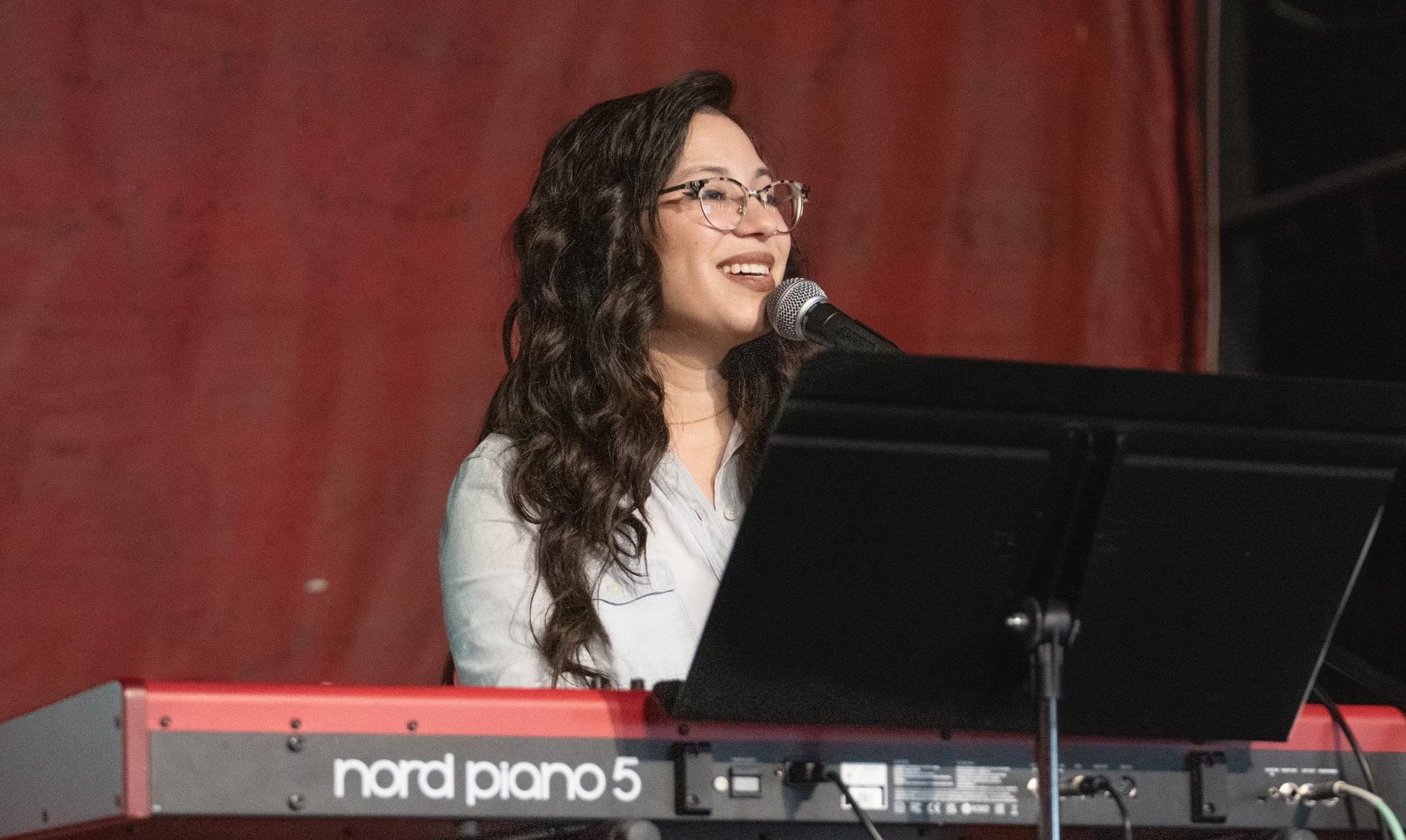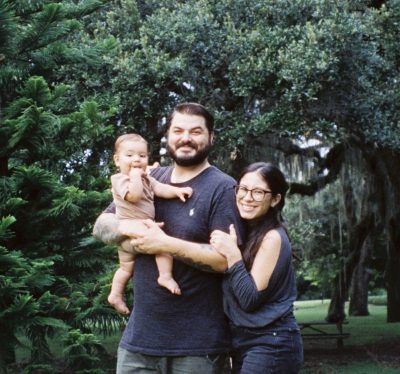Interview by the Rev. Dr. Jin Cho, Leader of the Revelation 7:9 Task Force
To celebrate National Hispanic Heritage Month, we’re getting to know some Hispanic leaders in C4SO who embody our values of kingdom, spirit, formation, mission and sacrament. First up, we’re delighted to introduce you to the Rev. Mickey Lowe.
Hi, C4SO! I’m Mickey. My husband Travis and I co-planted Trinity Anglican in Tampa, Florida. We officially launched in April of 2022. My husband I just got ordained into the diaconate, so that’s brand new, and we are really excited. Travis is a transitional deacon so he’ll become a priest, and that’s the next phase for him.
It has been an incredible journey, and we are so grateful for C4SO and all the people we’ve met that have encouraged us. It’s crazy but it is a privilege to be able to do this together as a team. We are grateful for all the people that God has brought to the church. We are a congregation averaging about 65 people on a Sunday morning.
I was born in Argentina in Buenos Aires. I moved to the United States when I was 4 years old. My parents were actually church planters themselves with the Hispanic Assemblies of God, and so planting is kinda in my blood! I moved to Tampa when I was 5, so I’ve basically spent most of my life here in Tampa—this is my home. This is where I feel called to plant.
 The Rev. Dr. Jin Cho: What was your transition like to the United States as a Latina? How [did it affect] your identity formation?
The Rev. Dr. Jin Cho: What was your transition like to the United States as a Latina? How [did it affect] your identity formation?
Mickey Lowe: Because my parents were ministers in the Spanish-speaking church here, we were in that world until I was in high school, when my parents retired from ministry. Up until then, my faith and culture were intertwined—I was in a Spanish-speaking church, I was in a community of Latinos/Latinas, and I am really grateful for that, because [my] faith and [my] culture are kind of [woven] together. I am thankful for that.
It did make it hard for me when I wanted to invite my school friends to church. It was all in Spanish, so sometimes they would come and not know what was going on.
But in my adolescence, it was a privilege to experience my faith and my culture together. I’m really grateful for lots of Spirit-filled experiences, lots of speaking in tongues from my Pentecostal world. But it wasn’t until high school, when I was attending a predominantly white evangelical church, that I [felt I] could invite some of my friends.
JC: Tell me more about your culture and faith and how that has shaped you. What insight do you have into the Christian life because of your cultural heritage?
into the Christian life because of your cultural heritage?
ML: We are planting in Tampa, specifically in a place called Ybor City. We have a very large population of immigrants from Latin America. For many, Spanish is their first or second language. Trinity is really committed to ministering to the people of the community that we are rooted in, so we do our best to make many portions of our service bilingual.
I’m grateful for my parents who made me speak only Spanish at home, so I would never forget it. [I’m also grateful] for growing up in a church, reading Scripture in Spanish, doing everything in the Spanish language. My Spanish language was preserved through my faith and family—and now I’m able to bring this gift to our services!
On Sunday morning [at Trinity], we read Scripture in Spanish, we do prayers in Spanish and English and a lot of songs—even if it is just a bridge or a chorus. We feel like this is what God is calling us to do, because of the people in our community!
I’ve had couple of people ask me, “Why do you do this? What is the purpose?” And I tell them the reason is twofold:
1) To minister to the folks who are already in our congregation, for whom Spanish is their first language. Even if they speak English, there is something powerful about hearing the gospel in your native language.
2) To invite people from our community into our church. If we are here to minister to the people around us, we want this to be a place where people can walk in and go, “I can hear something spoken in my own language!”
And because my native language was preserved, I’m able to minister to people in this way! And now we have team of Scripture readers who are bilingual, and they are excited about it!
JC: What is the benefit to non-Spanish speakers to hear Scripture read in Spanish and sing songs in Spanish?
ML: We found that our English-speaking people were very excited to hear things in Spanish! They were very excited to learn and say, “I get to learn Spanish too when I go to church! That’s kinda cool!” So, a lot of our people have been very open! They sing along in Spanish, even if they don’t speak it! It is a real dynamic that God has blessed us with.
For us, being diverse and open is part of our DNA; it is something we’ve communicated from the beginning. We are committed to the gospel in every sense, to every nation, every tribe, every tongue. And while we don’t speak every language, we recognize that we are rooted in a Spanish-speaking community, and we want to do the best we can to invite that into our life.
JC: What has been hard? Tell me about some of your struggles as you try to do this work.
ML: Well, as a plant, everything is brand new, so a lot of what we do, we realize we just have to explain it. And that’s true for Anglicanism in general, as a lot of folks who are joining us on Sunday mornings have never experienced the Anglican tradition. So, we explain about the liturgy, the creeds, and the Eucharist. And one of the things we explain is, “Here is why we incorporate the Spanish language into our service.” We have to explain and set the vision for it.
From the very beginning, we’ve tried to instill in our people that if we are to be committed to diversity, if we are going to be committed to living alongside one another—and we each bring a different experience—we have to have grace for one another. We are dependent on the Lord to give us grace, understanding and patience… Because it is hard to live alongside [one another], especially when we come from different backgrounds and bring different experiences to the table.
But we believe we are called to live together and be inclusive of diversity and languages—even different Latin American countries. We each have a different dialect, and [that] can be a barrier, but it makes us more dependent on God’s grace and wisdom. This is not just something that is going to happen; we have to work together to accomplish this harmony!
JC: Your husband Travis doesn’t have a Latino background, so do you feel like you two navigating this space as a couple has applications for how you do church as well?
ML: Sure. We know that in church planting, we are going to attract people like us. So we have a lot of couples and families at our church where one is Latino/a and one is not!
Even in our marriage, we’ve had to talk through and work out some of these cultural differences and figure out a way to have both! We’ve had to work that out in our own family with different cultures, practices and even spiritual experiences! My husband grew up in the Episcopal church, while I grew up in the Assemblies of God, and we met at an evangelical church. That’s led to a lot of conversations of, “So, what does this look like worked out in our life?”
It’s been that way in our faith as well. So, when we found the three-streams approach to worship, we were like “This is us, this is our experience!” There’s a way to live in that balance of being evangelical, liturgical and charismatic—and for us, doing things in both English and Spanish! It’s how it worked out in our marriage, and it’s how we see it played out in our church as well!
JC: What is your vision for the future? Where are you headed?
ML: Our hope has always been to be minister to the people God has rooted us in. This is crazy, but we had a family who was incredibly generous and gifted us money to buy a building in Ybor City! Not something we expected to do! And amazingly, we found a building less than a mile away from where we’ve been meeting. We feel like God is further opening the doors to be rooted in this city and be a neighborhood church! To have people come in from the houses in the neighborhood, for us to put down roots in our city to do life alongside one another. That’s our vision!



